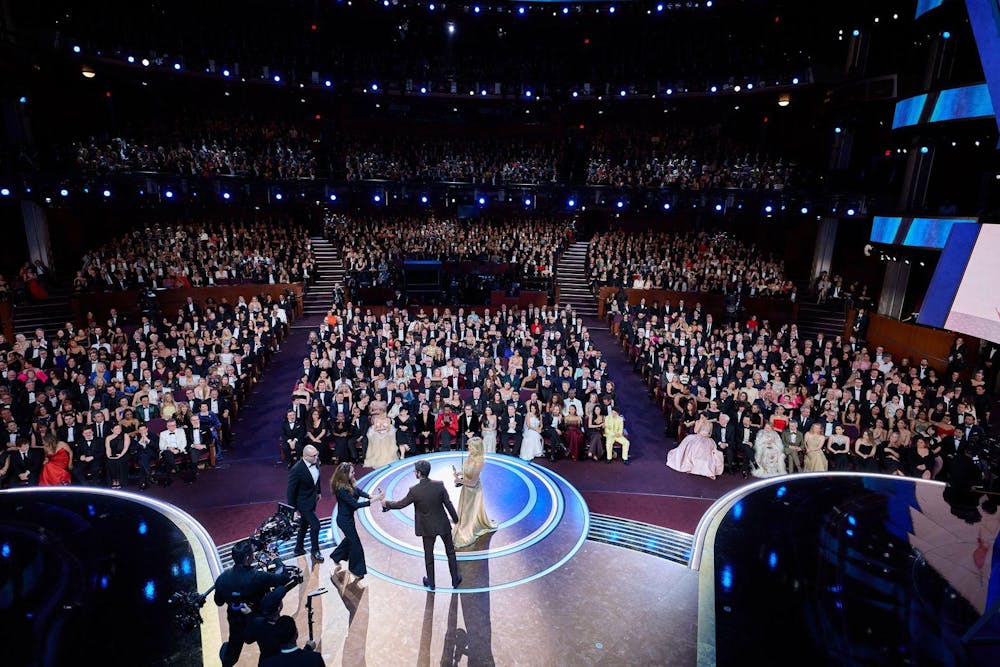The Academy Awards are frequently lauded as the biggest night in Hollywood and in film. Yet, Sunday night’s ceremony raised the question: What are the Oscars really about anymore?
Zoe Saldaña’s Best Supporting Actress win recognized her impressive performance in “Emilia Pérez,” which has been heavily criticized for its depiction of cartel violence and the transgender experience. But when a journalist from Mexico raised concerns about the film’s portrayal of the country, Saldaña dismissed them, saying that “the heart of this movie was not Mexico.”
Later in the show, “El Mal” from “Emilia Pérez” won Best Song. During the acceptance speech, the film’s music directors Clemént Ducol and Camille began singing a tune that was not even in the movie. It felt wildly out of place and went on for far too long, and even director Jacques Audiard appeared to be uncomfortable with it.
Adrien Brody’s Best Actor win for “The Brutalist” carried its own complications. While his speech had some redeeming moments, at times it felt like a beauty pageant queen’s call for world peace. At nearly six minutes, his acceptance speech is now the longest in Oscars history.
More concerning, though, was the role artificial intelligence played in enhancing the Hungarian accent of Brody’s character. If performances altered by AI can secure an Oscar, and the AI-assisted song “El Mal” can win Best Song, one is left wondering where the boundary is between human artistry and technological interference.
The Best Actress category was the biggest surprise of the night. Mikey Madison’s win for “Anora” was well-earned, but the performances of Cynthia Erivo, Demi Moore and Fernanda Torres were equally deserving. Each of these actresses embodied their role with unmatched depth, backed with and fostered by their influential journey in entertainment. But they were all overlooked in favor of a fresh face.
A similar debate surrounded Brody’s victory over Ralph Fiennes for “Conclave,” with Fiennes having never won an Oscar. These decisions pose the question of whether the Academy Awards exist to honor legacy in the industry or to catapult rising stars. The ceremony attempts to do both, but the limited nature of awards makes striking a true balance impossible.
The music choice during the show’s In Memoriam segment made what was supposed to be a somber and sentimental moment feel daunting and terrifying. The omission of Michelle Trachtenberg further confused viewers and exemplified the Academy’s inconsistency.
The show had a few meaningful moments. Though a strange and unexpected addition, the Los Angeles firefighters segment was an effective acknowledgement of the fires that ravaged the city earlier this year, with the firefighters cracking jokes alongside the host.
“I’m Not a Robot” winning Best Live Action Short Film was another of these moments. The win was a testament to true creativity and innovation, though shorts like “A Lien” and “Anuja” had the potential to highlight more pressing social issues with its inspirational artistry. This once again calls into question the Academy’s struggle to balance artistry, innovation and cultural impact.
The opening number delivered a popular spectacle that nearly defied gravity, with the Academy capitalizing on the star-studded cast and box-office success of “Wicked.” Paul Tazewell’s historic win as the first Black man to take home Best Costume Design for his work in “Wicked” was a deserved acknowledgment of excellence.
“No Other Land” winning Best Documentary was initially surprising, but the film’s collaboration between a Palestinian filmmaker and an Israeli journalist provided a moment of honest unity. The speech that followed was direct, unequivocally condemning the ongoing violence in Gaza in a night otherwise filled with apolitical speeches.
“Anora” secured five victories — including Best Picture — in a celebration of independent filmmaking. The film champions low-budget, sex-positive storytelling in a way that felt both groundbreaking and overdue. Director Sean Baker also became the first person to win four Oscars in one night for the same film.
Other victories further reinforced the importance of independent cinema. “Flow,” a Latvian low-budget animated feature, triumphed over its commercial competitors to win Best Animated Feature Film. “In the Shadow of the Cypress,” an Iranian-animated short exploring the trauma of war, received another well-deserved win for Best Animated Short Film.
The Academy is trying to accomplish everything at once — and it’s just not working. With every win and every snub, the tension between these competing objectives becomes more apparent. The ceremony continues to be an institution with undeniable cultural influence, but without a clear vision, its credibility risks dilution by the very chaos that defines it.
The Oscars’s cracks are showing. If the Academy doesn’t make up its mind soon, this year’s ceremony is merely a preview of what’s to come.





